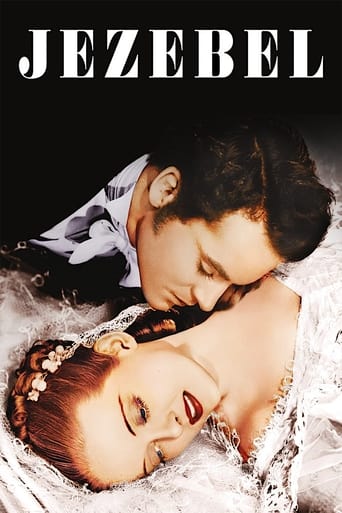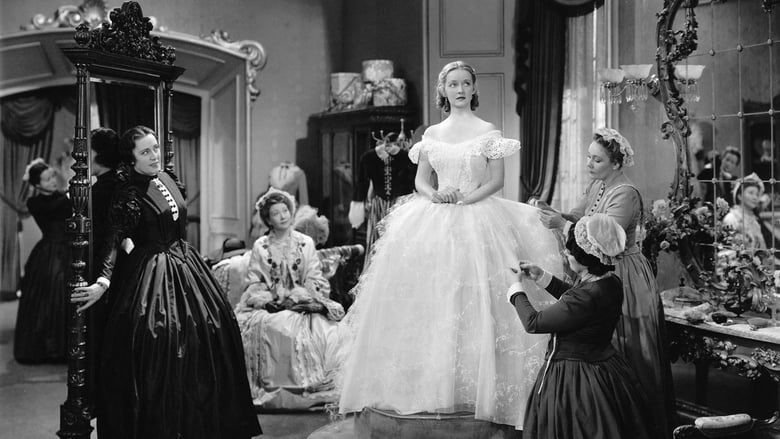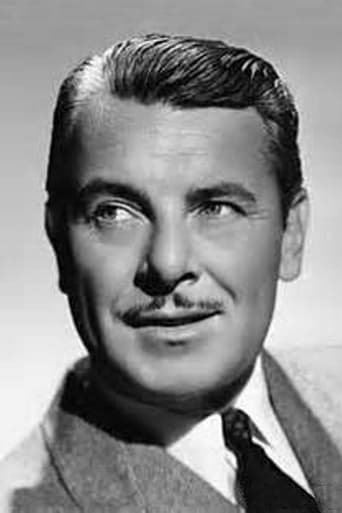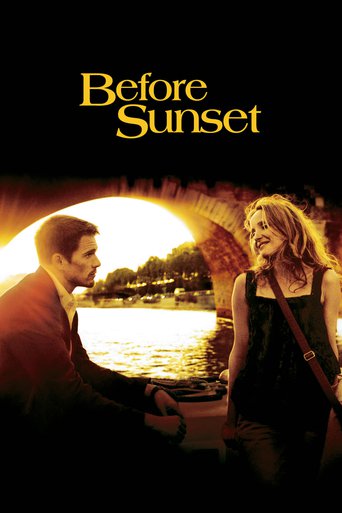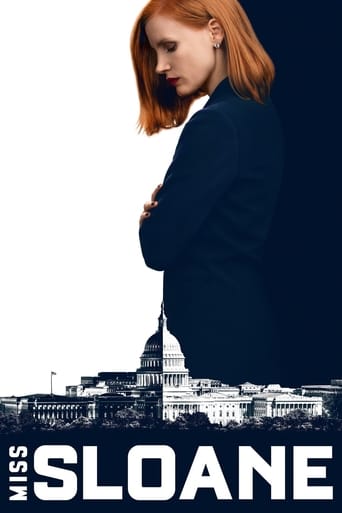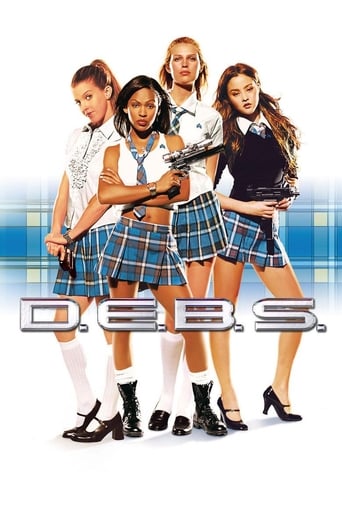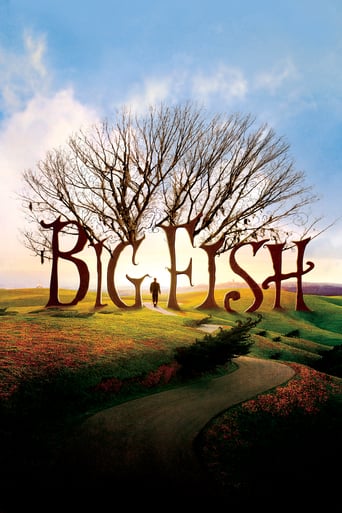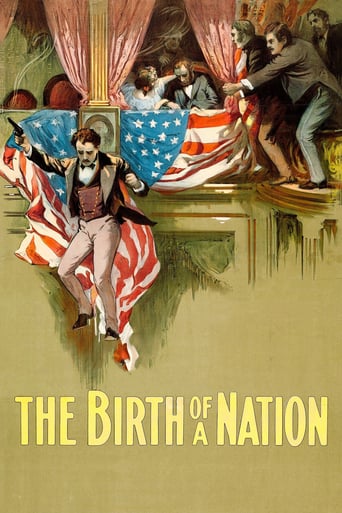Jezebel (1938)
In 1850s Louisiana, the willfulness of a tempestuous Southern belle threatens to destroy all who care for her.
Watch Trailer
Cast


Similar titles
Reviews
Director: WILLIAM WYLER. Screenplay: Clements Ripley & Abem Finkel, and John Huston. Adaptation: Robert Buckner. Based on the 1935 Broadway stage play by Owen Davis, Sr. Photography: Ernest Haller. Camera operator: Al Roberts. Assistant camera operator: Bud Weiler. Film editor: Warren Low. Music: Max Steiner. Songs: "Jezebel" by Harry Warren (music) and Johnny Mercer (lyrics); "Raise a Ruckus" by Harry Warren (music) and Al Dubin (lyrics). Music director: Leo F. Forbstein. Art director: Robert Haas. Costumes: Orry-Kelly. Technical adviser: Dalton S. Reymond. Stills cameraman: Mack Elliott. 2nd unit director: John Huston. 2nd assistant director: Arthur Lueker. Assistant director: Robert Ross. Sound recording: Robert B. Lee. Associate producer: Henry Blanke. Production manager: Tenny Wright. Producer: Hal B. Wallis. Executive producer: Jack L. Warner.Copyright 26 January 1938 by Warner Bros. Pictures, Inc. New York opening at the Radio City Music Hall, 10 March 1938 (ran 2 weeks). U.S. release: 26 March 1938. Australian release: 21 July 1938. 12 reels. 103 minutes.SYNOPSIS: Southern belle scandalizes the Old South by wearing a red strapless gown to a black-and-white ball.NOTES: Academy Award, Best Actress, Bette Davis (defeating Fay Bainter in White Banners, Wendy Hiller in Pygmalion, Norma Shearer in Marie Antoinette and Margaret Sullavan in Three Comrades). Academy Award, Best Supporting Actress, Fay Bainter (defeating Beulah Bondi in Of Human Hearts, Billie Burke in Merrily We Live, Spring Byington in You Can't Take It With You and Miliza Korjus in The Great Waltz).Also nominated for Best Picture (You Can't Take It With You), Cinematography (The Great Waltz) and Best Music Score (Alexander's Ragtime Band).Negative cost: around $1 million. Shooting commenced 18 October 1937 and finished 18 January 1938. — 42 days over schedule. (Wyler's mania for perfection — his insistence on endless takes — was blamed for the run-over).The stage play, produced by Katharine Cornell and Guthrie McClintic opened on Broadway at the Barrymore on 19 December 1933 and ran only 32 performances. It starred Miriam Hopkins and Joseph Cotten, and featured Cora Witherspoon as Aunt Belle.COMMENT: A lavish costume melodrama designed by its creators and players as a try-out for their employment (they hoped) on Gone With the Wind. As it happened, however, only composer Max Steiner reached that goal, although Jezebel is not only excellent entertainment but excels in every aspect of its production: flawless acting dominated by the driving portrayal of Bette Davis as the self-willed Julie; gorgeous costumes and no-expense-spared sets with hundreds of extras impressively regimented in spectacular crowd scenes — Wyler successfully showing off his mastery of both action and intimate, soul-baring emotional scenes. The film's only weakness is its facile soap opera script — high class soap opera, but still, for all its impeccable staging, as sudsy as a Hollywood bubble-bath.
. . . misbegotten soap opera, GONE WITH THE WIND, since JEZEBEL courageously blows the whistle on the Evils of Black Slavery while WIND set back American Race Relations at least a century (prompting umpteen lynchings, to boot). Even this summer, 76 years after that ill WIND first blew by us, GWTW fans are waltzing into Black Churches attempting to prove that Black Lives Don't Matter; anyone who can read the opening scroll of GWTW without standing up to scream at those Treason-praising lies needs to "self-deport" from America forthwith! Warner Bros. filmed JEZEBEL in Black & White, because Slavery and Race Relations are Black & White issues, hardly fit to be gussied up and glossed over in Technicolor. JEZEBEL features the top movie star of the late 1930s--Bette Davis--because of the serious nature of these issues (JEZEBEL producer Warner Bros. felt no need to cast a mentally unhealthy chick in the lead to garner unmerited publicity). Viewers cannot help seeing JEZEBEL's two mansions without thinking of the thousands of Racist Slave Floggings, brutal "wings-clipping" amputations, and "routine" bleeding-finger cotton-picking marathon work days slaving in the fields that made these germ-infested palaces possible. Henry Fonda's "Pres" character makes sure that his fellow Southerners know not only that theirs is a Lost Cause, but he explains WHY it is lost (unlike Clark Gable's immoral airhead GWTW playboy, Rhett Butler).
After my first Davis film was Al About Eve, I wanted to see some younger Davis. Seeing as how she won the Oscar for this it was only fair. Davis is magnificent. Funnily enough, it did remind me a lot of Scarlett O Hara in Gone with the Wind, and fair enough after I finished it I read that the studio offered Davis this role as an apology of some sorts because she didn't get the now legendary Gone with the Wind role. As it is, I could definitely see Davis as O Hara, and many of the same traits lie in Julie. This is a very good film, although it never really hits greatness, it's still very much worth watching and it's a strong addition to Davis' filmography.
Bette Davis gives a memorable performance as the eponymous character in director William Wyler's "Jezebel," a tragic tale of rivalry and romance in antebellum Louisiana about a treacherous dame who defies society and flaunts custom to get what she wants. Miss Julie wants handsome banker Preston Dillard. Temperamental, vain, and sagacious, Julie lives to please only herself and to the devil with anybody else. Basically, this is a classic treatment of girl wants guy, girl loses guy, and girl wins guy back of the most unorthodox kind. ScenaristS Clements Ripley, Abem Finkel, and John Huston based their sensational screenplay on Pulitzer Prize winning playwright Owen Davis' drama and there isn't a moment that isn't gripping. Mind you, "Jezebel" is not only set in the pre-Civil War South, but it was produced in Hollywood during the Jim Crow era. The protagonist makes a disparaging remark about sullen African-Americans and Wyler presents the slaves as obsequious and ignorant in their happiness. However, though this casts a pall over the narrative, it doesn't detract from his evocative portrait of a woman who refuses to stop loving her man even when he has taken a marriage vow to another woman. Incredibly enough, "Jezebel" gives a fairly accurate depiction of the troubles that plagued the South in those days before the Civil War. Nobody gives a bad performance and George Brent is particularly good as Buck Cantrell, an arrogant, pretentious blow-hard who receives his comeuppance. Oscar-winning "Gone with the Wind" lenser Ernest Haller makes everything look appropriately cinematic and you can tell who occupies the moral high ground. Wyler stages the duel between Buck Cantrell and Ted Dillard in such a way as to generate undeniable suspense. "Jezebel" is simply brilliant.

